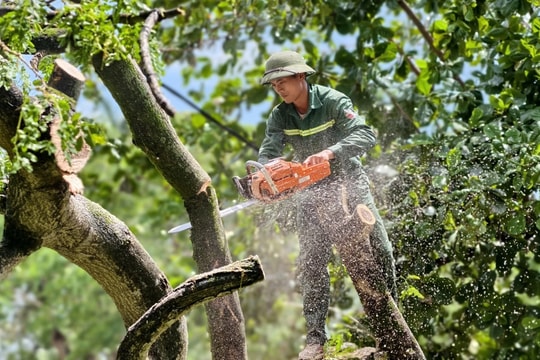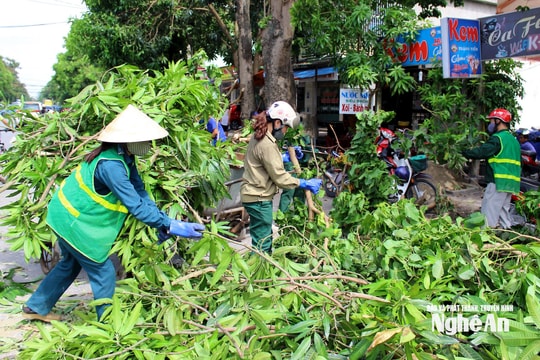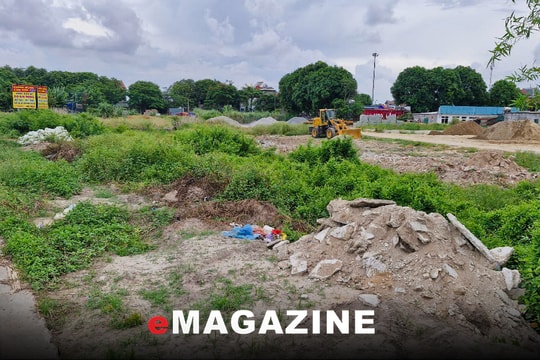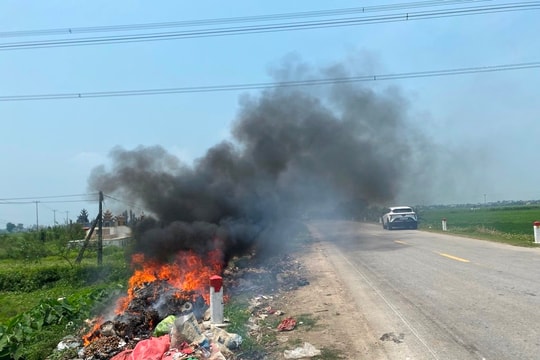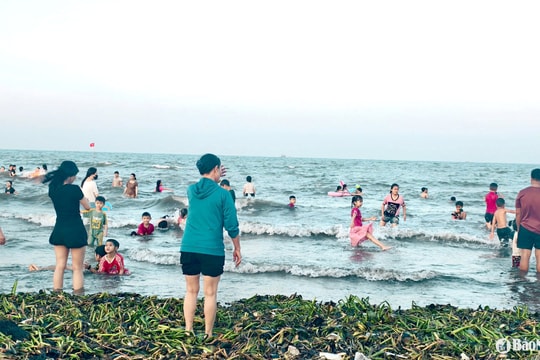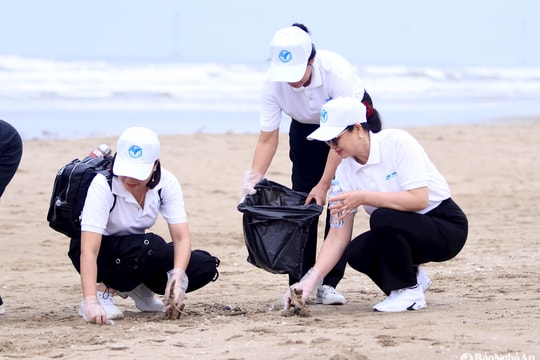Warning about the widespread use of pesticides
(Baonghean) - Every year, Nghe An uses about 300 tons of pesticides, resulting in an equivalent amount of pesticide waste of 15 - 20 tons. However, the amount of pesticide waste collected and safely treated each year accounts for only a very small portion.
Pesticide poisoning
In the fields, we often see farmers spraying pesticides without using protective gear. This causes pesticides to gradually seep into the body, which will seriously affect their health over time.
Ms. Nguyen Thi Lan in Hamlet 19, Dien Thanh Commune (Dien Chau), one of the cases of acute pesticide poisoning while spraying pesticides on crops, shared: “My family grows peanuts, from sowing to harvesting, we sprayed herbicides and pesticides at least 6-7 times... That time, I brought 6 spray bottles to spray 6 hectares of peanuts. As soon as I took the spray bottle off my back, suddenly my shoulders felt tired, my limbs were limp, my head ached severely, accompanied by nausea and convulsions... Guessing that I was poisoned by pesticides, I tried to walk home and asked my relatives to take me to the hospital for emergency treatment. Luckily, I was treated promptly and it did not affect my life, but since then, my limbs occasionally twitched and felt numb...”.
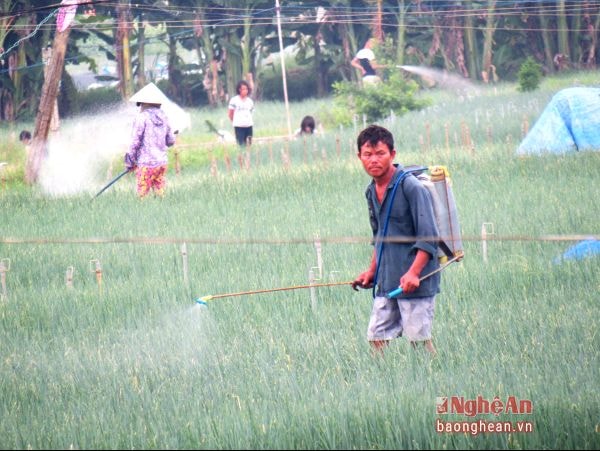 |
| People in Quynh Luong commune (Quynh Luu) spray pesticides on vegetables but do not use protective gear. |
In Nam Thanh commune (Yen Thanh), almost everyone knows Mr. Ta Quang Bien in Tran Phu hamlet with the job of "spraying pesticides" for those who hire him. 63 years old, with 6 years of living in this profession, Mr. Bien admitted that due to economic difficulties, he still has to do it even though he knows that this job involves contact with pesticides all day long, which are very toxic. He said: "People buy pesticides, I mix the pesticides myself according to the requirements of the field owners. After spraying 1 sao of rice, I am paid 30,000 - 40,000 VND. There are days when I wade around 2 mau of rice fields, earning 700,000 - 800,000 VND".
According to Mr. Bien, to “live with this profession”, the most important thing is to take good protection, not to let the pesticide come into contact with the body; to choose the direction of the wind to spray the pesticide; and to know how to rinse the tank, otherwise, the pesticide will seep into the hands and feet, and over time, it will cause illness. With such experience, but until now, after 2 years of “retirement”, he sometimes feels pain in his wrists and legs. Mr. Bien guesses that it is probably due to exposure to pesticides during spraying.
Abusive and arbitrary
Unstable weather, along with complicated epidemics, has led to an increase in the number and types of pesticides. There are always some poor quality pesticides on the market, which are ineffective when sprayed, forcing farmers to spray them over and over again. Worryingly, the indiscriminate use of pesticides, the wrong type of pesticides, and the use of pesticides not following the recommendations of authorities has had a significant impact on human health.
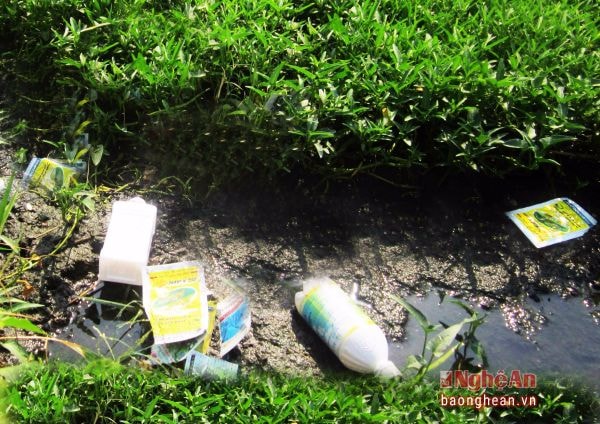 |
| Pesticide packaging thrown away by farmers on canals in Dien Thanh commune, Dien Chau district. |
According to Mr. Phan Van Hai - Deputy Head of the Department of Crop Production and Plant Protection, the results of the investigation and assessment of the current situation show that the abuse of pesticides in many localities is the most concerning issue. For example, in the recent summer-autumn rice crop, although the professional agencies actively recommended, many families still sprayed 4-5 times per batch of leaf rollers, while according to regulations, they only need to spray once.
The abuse of pesticides in agricultural production has left many consequences, such as: Pesticide residues on crops, causing pollution of soil and water resources, and difficulties in handling pesticide waste in the fields. With the mentality of wanting to prevent pests and kill insects quickly and effectively, many farmers arbitrarily increase the dosage and use pesticides not on the list. In many production areas, the amount of pesticides used is 2-3 times higher than normal, with high dosage and toxicity (exceeding the recommended level).
Farmers' use of pesticides is still inadequate due to limited knowledge of pesticides. The awareness and responsibility of pesticide users towards themselves and the community is not high, they do not see their responsibility for the quality of the products they make. They only care about productivity, but do not care about protecting their health and that of consumers, and do not ensure the quarantine period when spraying pesticides.
Mr. H, a household specializing in growing vegetables in X commune, shared: "There are times when the density of pests is so high that we have to spray once every 4-5 days, otherwise there will be no harvest." Like Mr. H, many other families often buy pesticides and follow the dealer's instructions, mixing 2-3 types of pesticides to spray, which is against the procedures recommended by the authorities. The dangers of pesticides to human health have been warned. However, for immediate benefits, many households have "bitten their tongues" and increased the dosage of pesticides in production, causing environmental pollution, threatening the health of themselves and consumers.
Littering of toxic waste in the fields
Nghe An has an agricultural production area of over 304,000 hectares, of which rice production land is over 114,000 hectares, vegetable production land is over 6,000 hectares and citrus fruit trees are 7,000 hectares. Due to the application of scientific and technical advances, new varieties... the productivity of crops has gradually increased. However, in recent years, facing the threat of pests and diseases as well as increasing the number of crops and rotations per unit area, farmers have increased the spraying of pesticides on crops.
Along the local roads, there are still many pesticide packaging scattered on the fields or floating on the water surface. Many farmers are struggling to mix pesticides, then throw the packaging on the edge of the field and "carelessly" spray the pesticides. Most people who spray pesticides often rinse their spraying equipment right in the fields or irrigation canals. Pesticide residues seep into the soil and groundwater, accumulating more and more...
According to a survey by the Department of Crop Production and Plant Protection, the amount of pesticides left on packaging after use accounts for 8-10%. Based on the annual crop area that must be sprayed with pesticides, the entire province uses about 300 tons of pesticides each year. Thus, every year, farmers leave a quantity of pesticides on packaging after using at least 20 tons of pesticides. |
PV Group

.jpg)
